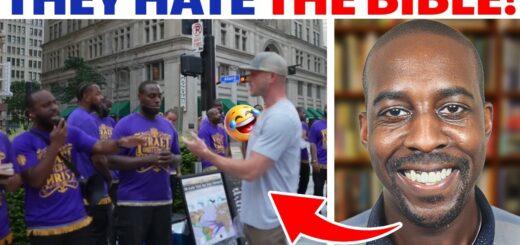Shaykh Uthman vs. a Christian Street Preacher in New York: Who Truly Sees Jesus?
In the middle of the chaos and noise of Times Square, one of the world’s busiest intersections, a spiritual confrontation unfolded that speaks to a much bigger war—one not between flesh and blood, but between truth and error.
Popular Muslim speaker Shaykh Uthman Ibn Farooq, known for challenging Christians on camera, approached a Christian street preacher in New York to argue that Jesus is not God.
His goal seemed clear: dismantle the foundation of the Christian faith by poking holes in the doctrine of Christ’s divinity.
But what actually happened mirrors what many believers often witness: someone presented the truth, opened the Scriptures, and still encountered spiritual blindness.
This wasn’t just a theological sparring match—it was a real-time demonstration of what it looks like when people hear the truth and still walk away unchanged.
As the debate unfolded, it became clear that the real issue wasn’t lack of evidence. It was a refusal to see.
 Who Did Jesus Pray To and The One Mediator Argument
Who Did Jesus Pray To and The One Mediator Argument
Shaykh Uthman opened with a go-to question in Muslim-Christian debates:
“If Jesus is God, who was He praying to?”
On the surface, this seems like a knockout argument. But it shows a fundamental misunderstanding of who Jesus is according to Scripture.
The Bible teaches that Jesus is fully God and fully man. As a man, He experienced everything we do—hunger, fatigue, temptation—and yes, prayer.
He prayed to the Father because He wasn’t just playing a role; He truly took on human flesh and lived as one of us.
Jesus praying doesn’t disprove His divinity—it proves His incarnation. Share on XShaykh Uthman then quoted 1 Timothy 2:5:
“For there is one God, and one mediator between God and men, the man Christ Jesus.”
He argued that this proves Jesus can’t be God since He stands between God and man.
But this argument collapses under closer examination. If Jesus isn’t God and isn’t man, what exactly is He mediating as? The verse confirms both His humanity and His ability to represent us before God.
“And without controversy great is the mystery of godliness: God was manifest in the flesh…” —1 Timothy 3:16
What Shaykh Uthman failed to understand is that Jesus is uniquely qualified to be the mediator precisely because of His dual nature. He’s not just a man. He is God in the flesh—perfectly positioned to reconcile the two.
 A Misuse of John 1 and Hebrews 2
A Misuse of John 1 and Hebrews 2
In response to John 1:1,
“In the beginning was the Word, and the Word was with God, and the Word was God.”
Shaykh Uthman resorted to linguistic gymnastics. He focused on the Greek word Logos, arguing that because it appears elsewhere in the Bible, it can’t always refer to divinity.
But context matters.
In John’s Gospel, Logos is not a random word tossed into a sentence—it’s a deliberate theological title. John isn’t saying Jesus is merely a message; he’s declaring that Jesus is the eternal Word who became flesh and dwelt among us.
“And the Word was made flesh, and dwelt among us…” —John 1:14
Trying to strip Jesus of His divinity by redefining Logos ignores the larger point John is making: Jesus is God from the beginning.
Next, Shaykh Uthman quoted Hebrews 2 and claimed that Jesus cannot be God, since the verse says He was made “a little lower than the angels.” But once again, context clarifies the truth.
“But we see Jesus, who was made a little lower than the angels for the suffering of death…” —Hebrews 2:9
Jesus was voluntarily made lower for a purpose—so that He could suffer and die for our sins. This wasn’t a loss of His divine nature. It was an act of humility, not inferiority.
God didn’t cease to be God when Jesus took on flesh—He displayed His glory by stepping into our mess to save us.
 Why the Blind Remain Blind
Why the Blind Remain Blind
One of the more ironic parts of the video happened before the debate even started.
As they walked over, one of the men with Shaykh Uthman said something about people being blind and unwilling to see the truth—even if it’s right in front of them.
And yet, that’s exactly what played out.
Despite hearing clear Scripture, despite logical explanations, Shaykh Uthman brushed it all aside.
He wasn’t engaging with the full Biblical context. He was more interested in “gotcha” moments than in genuine understanding.
This is not unique to Shaykh Uthman. Many people today, especially online, are more committed to their positions than to the truth.
They’ll reject Jesus not because the Bible isn’t clear—but because they don’t want to bow to Him as Lord.
 Jesus Is the Bridge—Because He Is Both God and Man
Jesus Is the Bridge—Because He Is Both God and Man
This confrontation in Times Square wasn’t just another street debate—it was a picture of what happens every day in the hearts of people around the world.
The preacher stood his ground without shouting or twisting the Scripture.
He simply pointed to the rightly divided Word of God and clearly explained that Jesus is the Word made flesh—the perfect mediator—not because He stood apart from God and man, but because He fully embodied both in one person.
Shaykh Uthman missed that truth, just as many still do. But for those with ears to hear, the message is unmistakable: Jesus is not just a prophet, not just a teacher—not even just a mediator. He is God with us.
“And they shall call his name Emmanuel, which being interpreted is, God with us.” —Matthew 1:23
If you’re wrestling with who Jesus is, don’t just settle for soundbites and debates. Open the Bible. Read it in context. Let the truth speak for itself.
Eternity isn’t based on opinions—it’s based on revelation. Share on XWant to go deeper? Read this next article where the same Shaykh tells a Christian Jesus isn’t God twice and fails.
WATCH THE VIDEO




























Recent Comments